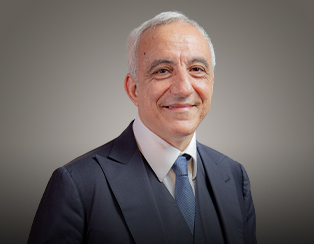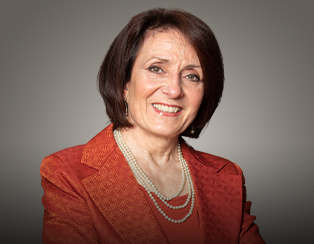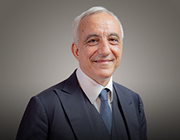Welcome to Fineco
Fineco offers banking, brokerage and investment services to retail clients from the convenience of a single multicurrency account.
Efficiency, innovation and transparency helped Fineco become one of the highest rated banks in Europe, with over 1.4 million customers.
A success story
Since launching in 1999, Fineco's mission has been to enhance the experience of online banking. Our business model allows us to offer a range of financial services designed to meet our clients' banking and investment needs, which they can access from an innovative and user- friendly platform.
-
£88.2 bn
Total Financial Assets
-
1.4 mln
Total clients
-
£37.2 bn
Assets in Private banking
-
6,000
Financial products offered
-
£4.8 bn
Net sales
-
24.4 mln
Executed trades in 1H22
-
£191 mln
Net profit adjusted*
-
19.14%
CET1
Exchange rate value as at June 30, 2022: EUR/GBP 0.8582
*Net profit adjusted for non-recurring items
Alessandro Foti
Chief Executive Officer and General Manager
Fabio Milanesi
Deputy General Manager and Head of It, Operations, Customer Care
Paolo Di Grazia
Deputy General Manager and Head ofGlobal Business

Alessandro Foti
Chief Executive Officer and General Manager
closeAlessandro Foti graduated with honours in Business and Economics from Bocconi University of Milan in 1984.
He began his professional career in the Financial Management Office of IBM in 1985. After three years of experience in Montedison S.p.A., where he became Head of financial coordination of the group's affiliate companies, in 1989 he joined Fin-Eco Holding S.p.A., with responsibility for capital market operations. In 1993 he became the Head of the operational section for administration, asset management and trading of Fin-Eco Sim S.p.A.. After being appointed as a member of the Board of Directors, General Manager and Managing Director, in 2002 he became Chairman of Fin-Eco Sim S.p.A.. After three years of experience as a member of the Management Committee of Assosim, in October 1999 he was appointed as a member of the Board of Directors of FinecoBank.
In 2001, he became a member of the Supervisory Board of Entrium Direct Bankers AG. From 2003 to 2005, he was a member of the Board of Directors of Ducati Motors Holding S.p.A. and General Manager of FinecoGroup S.p.A. (a company listed on the Midex segment of the Milan Stock Exchange).
From October 1999 to December 2000 he was a member of the Board of Directors of FinecoBank. From December 2000 to date he has served as Chief Executive Officer of FinecoBank and from July 2014 also as General Manager. From May 2010 to January 2015 he was Vice Chairman of the Supervisory Board of DAB Bank AG. From April 2012 to April 2014 he was a member of the Management Committee of Assoreti. From 2013 to 2019 he has been a member of the Executive Management Committee of UniCredit Group. Since April 2014 he has been Director and Vice Chairman of Assoreti. He has been a member of the Board of Directors of Borsa Italiana S.p.A. from July 2014 to October 2020.
In 2017, 2018 and 2019 he was awarded by Institutional Investor as best CEO in Europe in the banking industry for the Small&Mid Cap category.
Since 9 November 2018 he has been a member of the Board of Directors of Bocconi University of Milan.
Fabio Milanesi
Deputy General Manager and Head of It, Operations, Customer Care
closeHe is the Head of the Global Business Services Department (GBS). He began his career working for «Studio Agente di Cambio dott. Gaudenzi» in 1989. He joined Fin-eco Sim in 1992 as Administrative Director. He is now Deputy General Manager in Fineco.
Paolo Di Grazia
Deputy General Manager and Head of Global Business
closeHe graduated in Business Economics in 1994 from the Bocconi University of Milan. Immediately after gaining his degree, he moved to the United States and worked at the Republic National Bank of New York, dealing with derivative products. He returned to Italy in 1998 to take on the role of Business Development Director at Matrix S.p.A., where he contributed to the start up and development of the online trading platform for Fineco SIM, as well as product development and management for the Fineco brand. He joined the Company in 2004, taking on responsibility for the development and management of the retail and the trading desk. In 2007 he was appointed as Head of Direct Bank with responsibility for banking, brokerage and the trading desk. In 2015 he was appointed as Deputy General Manager. He oversees each area of business from the development of banking platforms, brokerage, investing, Marketing & Innovation to Brand & Advertising and since 19th September 2018, he also manages Investment Products & Advisory Solutions and Financial Advisory Services Units. Since 2008 he is a member of the Fineco Management Committee and since 2013 has held the position of Vice-President and member of the Executive Committee of Assosim. On 27 July 2021 he was appointed the new director of HI-MTF SIM Spa, following the acquisition of 20% of the company's share capital by FinecoBank.
Mauro Albanese
Deputy General Manager and Head of Network PFA & Private Banking
Lorena Pelliciari
Chief Financial Officer
Giovanni Boneschi
Chief Risk Officer
Mauro Albanese
Deputy General Manager and Head of Network PFA & Private Banking
closeHe graduated in Economics and Banking in 1984 from the University of Siena. He began his career in IMIgest, where he held the role of Head of the Research and Analysis Office. After several years as Head of Development of Financial and Insurance Products of Banca Fideuram (from 1998), in the 2001 he joined the UniCredit Group to help with the start-up of Xelion and was appointed as Head of Network in 2003. In 2005 he took on the position of Business Integration Manager for the Private Banking Division (where he became Head of Planning at European level). At the end of 2007 he returned to Xelion Banca and, following its merger into Fineco in 2008, he was appointed as Head of the Network PFA Sales Department. Since 19th September 2018, following the change in the FinecoBank’s organizational structure, the Department has been renamed as Network PFA and Private Banking. In 2021 he was appointed as Deputy General Manager of the Bank.
Lorena Pelliciari
Chief Financial Officer (C.F.O.)
closeAs Chief Financial Officer, within Fineco, she is also Executive Manager and Chairperson of the Management Committee for Sustainability. She manages all administrative and fiscal services related to accounting and preparation of Financial Statements, Treasury, Strategic Planning, Management Control, Investor Relations (post listing of Fineco) and the Sustainability team. She began her career in the banking industry in 1980 and joined Fineco's management team from its inception. For five years she was C.F.O. of Asset Gathering in the former parent company UniCredit with responsibility for the management consolidation of an Austrian and German bank. She is currently a member of the Board of Directors of the Interbank Deposit Protection Fund.
Giovanni Boneschi
Chief Risk Officer
closeGraduated in Computer Engineering in 2002 at Politecnico di Milano, he began his career at SOL-TEC, a system integrator operating in the financial sector. In 2007 he joined Fineco, first within the ICT Department and then on the Chief Risk Officer Department. In 2008 he obtained an Executive Master in Business Administration at SDA Bocconi School of Management. In 2010 he became head of Risk Management Unit reporting directly to the CRO. In 2020 he was appointed CRO of FinecoBank. As CRO, he is responsible for verifying capital and liquid adequacy, ensuring the effectiveness of the Group's risk management system.
Andrea Pepe
Head of Legal & Corporate Affairs Department
Silvio Puchar
Chief Compliance Officer
Andrea Pepe
Head of Legal & Corporate Affairs Department
closeHe is Head of the Legal & Corporate Affairs Department, which comprises the functions of Corporate Affairs, Legal Research, Complaints and Legal Affairs. He gained a Degree in Law in 1997 from the Sacro Cuore Catholic University of Milan and subsequently authorisation to practice the legal profession. He began his career at the Camozzi & Bonissoni Law and Tax firm, specialised in financial markets, banking and insurance law. In 2003, he joined FinecoGroup SpA, a sub-holding parent of FinecoBank, among others. He held increasingly important roles in the legal area to then become Head of the Legal Function in 2005. In 2006, he joined FinecoBank as Head of the Legal and Corporate Affairs Area. He oversees all aspects of legal advice and support for business and product development, also resulting from regulatory changes, as well as the establishment of the processes and activities designed to prevent legal disputes.
Silvio Puchar
Chief Compliance Officer
closeHe is in charge of the Compliance Department, which also includes the anti-money laundering function. He graduated in Business in 1989 from Bocconi University in Milan and began his career as an auditor with a specialisation in finance and credit at KPMG SpA. In 1992 he joined Finreme Sim (former Cariplo group), becoming the Head of Administration, Financial Reports and Relations with Supervisory Bodies. In 1998, he joined Fin-eco Sim as Audit Manager, setting up the internal control function. From 2001 to 2005 he served as FinecoBank's Internal Audit Manager. Since 2005 he has been the head of FinecoBank's Compliance function, guiding its creation and outlining its activities and processes.
Shareholders' Meeting April 28, 2022
The Shareholders' Meeting is the body that represents the interest of all shareholders and expresses the corporate will through its resolutions.
The Shareholders' Meeting has the authority to pass resolutions in ordinary and extraordinary session with the meeting and voting quorums provided for by Law, taking into account the specific matters under review.
The Ordinary Shareholders' Meeting approves, inter alia, the financial statements and resolves on profit distribution, appoints Directors and Statutory Auditors. It also appoints the independent auditing firm to perform the Independent Statutory Audit, setting its compensation. Moreover, it resolves on remuneration and incentivisation policies and practices provided for by prevailing regulations.
The Extraordinary Shareholders' Meeting has the authority to resolve on amendments to the Articles of Association, capital increase transactions, mergers and de-mergers.
Shareholders' Meeting documentation
| Documentation | |
|---|---|
| Notice of call | |
| Excerpt of the Notice of Call | |
| Directors' Report items of the Agenda of the Shareholders’ Meeting | |
| Proxy form and voting instructions to the Appointed Representative | |
| Ordinary proxy form | |
| Certification of Representative (Article 135-novies of the Legislative Decree no. 58 of February 24, 1998) | |
| Remuneration policy and report | |
| Annex I to the Remuneration policy and report - Disclosure on remuneration pursuant to art. 450 of the Regulation (EU) no. 575/2013 and the Regulation (EU) no. 637/2021 | |
| Annex II to the Remuneration policy and report - Compensation systems based on financial instruments for FinecoBank staff | |
| Report on Corporate Governance and Ownership Structures 2021 | |
| Accounts and Reports 2021 |
Other documents
| Documentation | |
|---|---|
| Side presentation relating to the Remuneration policy and report | |
| 2021 Consolidated Non-Financial Statement | |
| Votes summary report | |
| Minutes of the Shareholders' Meeting |
Shareholders' Meetings 2021
The Shareholders' Meeting is the body that represents the interest of all shareholders and expresses the corporate will through its resolutions.
The Shareholders' Meeting has the authority to pass resolutions in ordinary and extraordinary session with the meeting and voting quorums provided for by Law, taking into account the specific matters under review.
The Ordinary Shareholders' Meeting approves, inter alia, the financial statements and resolves on profit distribution, appoints Directors and Statutory Auditors. It also appoints the independent auditing firm to perform the Independent Statutory Audit, setting its compensation. Moreover, it resolves on remuneration and incentivisation policies and practices provided for by prevailing regulations.
The Extraordinary Shareholders' Meeting has the authority to resolve on amendments to the Articles of Association, capital increase transactions, mergers and de-mergers.
Shareholders' Meeting documentation October 21, 2021
| Documentation | |
|---|---|
| Notice of call | |
| Excerpt of the Notice of Call | |
| Directors' Report item of the Agenda of the Shareholders’ Meeting | |
| Proxy form and voting instructions to the Appointed Representative | |
| Ordinary proxy form | |
| Certification of Representative (Article 135-novies of the Legislative Decree no. 58 of February 24, 1998) | |
| Answers to questions on items on the agenda |
Other documents
| Documentation | |
|---|---|
| Votes summary report | |
| Minutes of the Shareholders' Meeting |
Shareholders' Meeting documentation April 28, 2021
| Documentation | |
|---|---|
| Notice of call | |
| Excerpt of the Notice of Call | |
| Proxy form and voting instructions to the Appointed Representative | |
| Ordinary proxy form | |
| Certification of Representative (Article 135-novies of the Legislative Decree no. 58 of February 24, 1998) | |
| Directors' Reports item of the Agenda of the Shareholders’ Meeting in Ordinary and Extraordinary Part | |
| Qualitative and quantitative composition of the Board of Directors of FinecoBank S.p.A. | |
| Qualitative and quantitative composition of the Board of Statutory Auditors of FinecoBank S.p.A. | |
| Information on the integration of the Board of Directors | |
| Information on the integration of the Board of Statutory Auditors | |
| Candidacies for the completion of the Board of Statutory Auditors | |
| Remuneration policy and report | |
| Annex I to the Remuneration policy and report – Information tables pursuant to art. 84-quater of the Regulation n° 11971 issued by Commissione Nazionale per le Società e la Borsa (Consob) | |
| Annex II to the Remuneration policy and report – Compensation systems based on financial instruments for FinecoBank staff | Report on Corporate Governance and Ownership Structures 2020 | Reports and Accounts 2020 | Answers to questions on items on the agenda |
Other documents
| Documentation | |
|---|---|
| Side presentation relating to the Remuneration policy and report | |
| 2020 Consolidated Non-Financial Statement - FinecoBank Group | |
| Votes summary report | |
| Minutes of the Shareholders' Meeting |
Shareholders' Meetings 2020
The Shareholders' Meeting is the body that represents the interest of all shareholders and expresses the corporate will through its resolutions.
The Shareholders' Meeting has the authority to pass resolutions in ordinary and extraordinary session with the meeting and voting quorums provided for by Law, taking into account the specific matters under review.
The Ordinary Shareholders' Meeting approves, inter alia, the financial statements and resolves on profit distribution, appoints Directors and Statutory Auditors. It also appoints the independent auditing firm to perform the Independent Statutory Audit, setting its compensation. Moreover, it resolves on remuneration and incentivisation policies and practices provided for by prevailing regulations.
The Extraordinary Shareholders' Meeting has the authority to resolve on amendments to the Articles of Association, capital increase transactions, mergers and de-mergers.
Shareholders' Meeting documentation April 28, 2020
| Documentation | |
|---|---|
| Notice of call | |
| Excerpt of the Notice of Call | |
| Supplement to the Notice of Call | |
| Proxy form to the Designated Representative | |
| Ordinary proxy form | |
| Certification of Representative (Article 135-novies of the Legislative Decree no. 58 of February 24, 1998) | |
| Directors' Reports item of the Agenda of the Shareholders’ Meeting in Ordinary and Extraordinary Part | |
| Directors' Reports items 1 and 2 of the Agenda of the Shareholders’ Meeting in Ordinary Part – Report replaced on April 6, 2020 | |
| Information on the procedure for appointing the corporate bodies of FinecoBank | |
| Template ''Letter form for the submitting of lists for the appointment of members of the Board of Directors'' - Annex A | |
| Template ''Declaration form certifying the existence or absence of any relationship of affiliation'' - Annex B | |
| Template ''Acceptance Statement'' and relevant annex (“Statement concerning the knowledge / expertise accrued in the areas of competency envisaged by the document named Qualitative and quantitative composition of the Board of Directors of FonecoBank S.p.A.”) - Annex C | |
| Template ''Letter form for the submitting of lists for the appointment of Statutory Auditors'' - Annex A1 | |
| Template ''Declaration form certifying the existence or absence of any relationship of affiliation'' - Annex B1 | |
| Template ''Acceptance Statement'' - Annex C1 | |
| Privacy statement pursuant to UE Regulation no. 2017/679 - Annex D | |
| Qualitative and quantitative composition of the Board of Directors of FinecoBank S.p.A. | |
| Qualitative and quantitative composition of the Board of Statutory Auditors of FinecoBank S.p.A. | |
| Process for selecting candidates for membership of the Board of Directors | |
| List No. 1 BoD - List of the Board of Directors and proposal on the number of Directors and duration of their term of office | |
| List No. 1 BoD - Board of Directors selection process and introduction of the candidates | |
| List No. 2 BoD - List submitted by institutional investors | |
| List No. 1 Board of Statutory Auditors - List submitted by institutional investors and proposal on the remuneration of the Board of Statutory Auditors | |
| 2020 Compensation Policy | |
| Annex I to 2020 Compensation Policy | |
| Annex II to 2020 Compensation Policy | |
| Reports and Accounts 2019 | |
| Report on Corporate Governance and Ownership Structures 2019 |
Other documents
| Documentation | |
|---|---|
| Side presentation relating to the 2020 Compensation Policy | |
| 2019 Consolidated Non-Financial Statement - FinecoBank Group | |
| Votes summary report | |
| Minutes of the Shareholders' Meeting |
Shareholders' Meeting documentation February 18, 2020
| Documentation | |
|---|---|
| Notice of call | |
| Excerpt of the Notice of Call | |
| Proxy form and voting instructions to the Appointed Representative | |
| Ordinary proxy form | |
| Certification of representative (Article 135-novies of the Legislative Decree no. 58 of February 24, 1998) | |
| Director's Report | |
| Information on the integration of the Board |
Other documents
| Documentation | |
|---|---|
| Votes summary report | |
| Minutes of the Shareholders' Meeting |
Shareholders' Meeting April 10, 2019
The Shareholders' Meeting is the body that represents the interest of all shareholders and expresses the corporate will through its resolutions.
The Shareholders' Meeting has the authority to pass resolutions in ordinary and extraordinary session with the meeting and voting quorums provided for by Law, taking into account the specific matters under review.
The Ordinary Shareholders' Meeting approves, inter alia, the financial statements and resolves on profit distribution, appoints Directors and Statutory Auditors. It also appoints the independent auditing firm to perform the Independent Statutory Audit, setting its compensation. Moreover, it resolves on remuneration and incentivisation policies and practices provided for by prevailing regulations.
The Extraordinary Shareholders' Meeting has the authority to resolve on amendments to the Articles of Association, capital increase transactions, mergers and de-mergers.
Shareholders' Meeting documentation
| Documentation | |
|---|---|
| Notice of call | |
| Excerpt of the Notice of Call | |
| Proxy form and voting instructions to the Appointed Representative | |
| Ordinary proxy form | |
| Certification of representative (Article 135-novies of the Legislative Decree no. 58 of February 24, 1998) | |
| Director's Report | |
| 2019 Compensation Policy | |
| Annex 1 to 2019 Compensation Policy | |
| Annex 2 to 2019 Compensation Policy | |
| Termination payments policy | |
| Report on Corporate Governance and Ownership Structures 2018 | |
| Reports and Accounts 2018 |
Other documents
| Documentation | |
|---|---|
| Side Presentation relating to the 2019 Compensation Policy | |
| Votes summary report | |
| Minutes of the Ordinary Shareholders' Meeting | |
| Minutes of the Extraordinary Shareholders' Meeting |
Shareholders' Meeting April 10, 2018
The Shareholders' Meeting is the body that represents the interest of all shareholders and expresses the corporate will through its resolutions.
The Shareholders' Meeting has the authority to pass resolutions in ordinary and extraordinary session with the meeting and voting quorums provided for by Law, taking into account the specific matters under review.
The Ordinary Shareholders' Meeting approves, inter alia, the financial statements and resolves on profit distribution, appoints Directors and Statutory Auditors. It also appoints the independent auditing firm to perform the Independent Statutory Audit, setting its compensation. Moreover, it resolves on remuneration and incentivisation policies and practices provided for by prevailing regulations.
The Extraordinary Shareholders' Meeting has the authority to resolve on amendments to the Articles of Association, capital increase transactions, mergers and de-mergers.
Shareholders' Meeting documentation
| Documentation | |
|---|---|
| Notice of call | |
| Excerpt of the Notice of Call | |
| Proxy form and voting instructions to the Appointed Representative | |
| Ordinary proxy form | |
| Certification of representative (Article 135-novies of the Legislative Decree no. 58 of February 24, 1998) | |
| Director's Report | |
| Information for the filing of candidacies | |
| 2018 Compensation Policy | |
| Annex 1 to 2018 Compensation Policy | |
| Annex 2 to 2018 Compensation Policy | |
| Report on Corporate Governance and Ownership Structures 2017 | |
| FinecoBank S.p.A. 2017 Reports and Accounts | |
| Candidacies for the completion of the Board of Statutory Auditors of FinecoBank |
Other documents
| Documentation | |
|---|---|
| Side Presentation relating to the 2018 Compensation Policy | |
| Votes summary report | |
| Minutes of the Ordinary Shareholders' Meeting | |
| Minutes of the Extraordinary Shareholders' Meeting |
Shareholders' Meeting April 11, 2017
The Shareholders' Meeting is the body that represents the interest of all shareholders and expresses the corporate will through its resolutions.
The Shareholders' Meeting has the authority to pass resolutions in ordinary and extraordinary session with the meeting and voting quorums provided for by Law, taking into account the specific matters under review.
The Ordinary Shareholders' Meeting approves, inter alia, the financial statements and resolves on profit distribution, appoints Directors and Statutory Auditors. It also appoints the independent auditing firm to perform the Independent Statutory Audit, setting its compensation. Moreover, it resolves on remuneration and incentivisation policies and practices provided for by prevailing regulations.
The Extraordinary Shareholders' Meeting has the authority to resolve on amendments to the Articles of Association, capital increase transactions, mergers and de-mergers.
Shareholders' Meeting documentation
| Documentation | |
|---|---|
| Notice of call | |
| Excerpt of the Notice of Call | |
| Proxy form and voting instructions to the Appointed Representative | |
| Ordinary proxy form | |
| Certification of representative (Article 135-novies of the Legislative Decree no. 58 of February 24, 1998) | |
| Directors' Reports item 1, 2, 3, 4, 5 and 6 of the Agenda | |
| Information concerning the appointment of the Board of Directors and the Board of Statutory Auditors | |
| Template ''Letter form for the submitting of lists for the appointment of members of the Board of Directors'' - Annex A | |
| Template ''Declaration form certifying the existence or absence of any relationship of affiliation'' - Annex B | |
| Template ''Acceptance Statement'' and template ''Qualitative-quantitative profile statement'' - Annexes C e D | |
| Template ''Letter form for the submitting of lists for the appointment of Statutory Auditors'' - Annex A1 | |
| Template ''Declaration form certifying the existence or absence of any relationship of affiliation'' - Annex B1 | |
| Template ''Acceptance Statement'' - Annex C1 | |
| Directors' Reports item 7, 8, 9, 10, 11 and 12 of the Agenda - Ordinary Part and item 1 and 2 of the Agenda - Extraordinary Part | |
| 2017 Compensation Policy | |
| Annex 1 to 2017 FinecoBank Compensation Policy | |
| Annex 2 to 2017 FinecoBank Compensation Policy | |
| Termination payments policy | |
| Candidacies for the appointment of the Board of Directors of FinecoBank S.p.A. | |
| Candidacies for the appointment of the Board of Statutory Auditors of FinecoBank S.p.A. |
Other documents
| Documentation | |
|---|---|
| Side Presentation relating to the 2017 Compensation Policy | |
| Votes summary report | |
| Minutes of the Extraordinary Shareholders'Meeting | |
| Minutes of the Ordinary Shareholders' Meeting |
Shareholders' Meeting 12 April 2016
The Shareholders' Meeting is the body that represents the interest of all shareholders and expresses the corporate will through its resolutions.
The Shareholders' Meeting has the authority to pass resolutions in ordinary and extraordinary session with the meeting and voting quorums provided for by Law, taking into account the specific matters under review.
The Ordinary Shareholders' Meeting approves, inter alia, the financial statements and resolves on profit distribution, appoints Directors and Statutory Auditors. It also appoints the independent auditing firm to perform the Independent Statutory Audit, setting its compensation. Moreover, it resolves on remuneration and incentivisation policies and practices provided for by prevailing regulations.
The Extraordinary Shareholders' Meeting has the authority to resolve on amendments to the Articles of Association, capital increase transactions, mergers and de-mergers.
Shareholders' Meeting documentation
| Documentation | |
|---|---|
| Notice of Meeting | |
| Excerpt of the Notice of Meeting | |
| Proxy of the Company's designated Representative | |
| Proxy | |
| Directors' Reports | |
| FinecoBank S.p.A. 2015 Reports and Accounts | |
| 2016 Compensation Policy | |
| Report on Corporate Governance and Ownership Structures 2015 | |
| Summary report of the votes | |
| Minutes |
Shareholders' Meeting 23 April 2015
The Shareholders' Meeting is the body that represents the interest of all shareholders and expresses the corporate will through its resolutions.
The Shareholders' Meeting has the authority to pass resolutions in ordinary and extraordinary session with the meeting and voting quorums provided for by Law, taking into account the specific matters under review.
The Ordinary Shareholders' Meeting approves, inter alia, the financial statements and resolves on profit distribution, appoints Directors and Statutory Auditors. It also appoints the independent auditing firm to perform the Independent Statutory Audit, setting its compensation. Moreover, it resolves on remuneration and incentivisation policies and practices provided for by prevailing regulations.
The Extraordinary Shareholders' Meeting has the authority to resolve on amendments to the Articles of Association, capital increase transactions, mergers and de-mergers.
Shareholders' Meeting documentation
| Documentation | |
|---|---|
| Notice of Meeting | |
| Proxy of the Company's designated Representative | |
| Proxy | |
| Directors' Reports | |
| FinecoBank S.p.A. 2014 Reports and Accounts | |
| Compensation Policy 2015 | |
| Termination Payments Policy 2015 | |
| Report on Corporate Governance and Ownership Structures 2014 | |
| Summary report of the votes | |
| Minutes |
Company Boards
Board of Directors
The Board of Directors was appointed by the Ordinary Shareholders' Meeting of FinecoBank of 28 April 2020 and will remain in office until the approval of annual financial statements as at 31 December 2022. The Board of Directors has the following members:
| Name and Surname | Position | Place and date of birth | In office since |
|---|---|---|---|
| Marco Mangiagalli | Chairman | Milano 08/03/1949 |
28/04/2020 |
|
Marco Mangiagalli - Chairman |
|||
| Francesco Saita | Vice Chairman | Milano 15/10/1967 |
28/04/2020 |
|
Francesco Saita - Vice Chairman |
|||
| Alessandro Foti | Managing Director and General Manager | Milano 31/08/1960 |
28/04/2020 |
|
Alessandro Foti - Managing Director and General Manager |
|||
| Patrizia Albano | Director | Napoli 29/08/1953 |
28/04/2020 |
|
Patrizia Albano - Director |
|||
| Elena Biffi | Director | Milano 27/01/1966 |
28/04/2020 |
|
Elena Biffi - Director |
|||
| Giancarla Branda | Director | Sant’Agata di Esaro (CS) 16/07/1961 |
28/04/2020 |
|
Giancarla Branda - Director |
|||
| Paola Giannotti De Ponti | Director | Alessandria 13/07/1962 |
28/04/2020 |
|
Paola Giannotti De Ponti - Director |
|||
| Marin Gueorguiev | Director | Bourgas (Bulgaria) 02/04/1972 |
28/04/2020 |
|
Marin Gueorguiev - Director |
|||
| Gianmarco Montanari | Director | Novara 20/04/1972 |
28/04/2020 |
|
Gianmarco Montanari - Director |
|||
| Alessandra Pasini | Director | Padova 19/09/1973 |
28/04/2021 |
|
Alessandra Pasini - Director |
|||
| Maria Alessandra Zunino De Pignier | Director | Roma 01/05/1952 |
28/04/2020 |
|
Maria Alessandra Zunino De Pignier - Director |
|||
The members of the Board of Directors are domiciled for the purpose at the Company's registered office.
List of the skills possessed by the Directors in compliance with the document "Qualitative and quantitative composition of the Board of Directors of FinecoBank S.p.A.".
List of competences
PDFBoard of Statutory Auditors
The Board of Statutory Auditors currently in office is made up of five members, of which three are acting statutory auditors and two alternates. The Board of Statutory Auditors will remain in office until the approval of the financial statements for the year ended 31 December 2022. The Board of Statutory Auditors has the following members:
| Name and Surname | Position | Place and date of birth | In office since |
|---|---|---|---|
| Luisa Marina Pasotti | Chairwoman | Gallarate (VA) 06/08/1961 |
28/04/2021 |
|
Luisa Marina Pasotti - Chairwoman |
|||
| Massimo Gatto | Standing Statutory Auditor | Roma 27/06/1963 |
28/04/2020 |
|
Massimo Gatto - Standing Statutory Auditor |
|||
| Giacomo Ramenghi | Standing Statutory Auditor | Bologna 09/10/1970 |
28/04/2021 |
|
Giacomo Ramenghi - Standing Statutory Auditor |
|||
| Lucia Montecamozzo | Alternate Statutory Auditor | Milano 16/09/1966 |
28/04/2021 |
| Alessandro Gaetano | Alternate Statutory Auditor | Napoli 05/06/1962 |
28/04/2021 |
The members of Board of Statutory Auditors are domiciled for the purpose at the Company's registered office.
FinecoBank Corporate Bodies Regulations
PDFSupervisory Committee
In a resolution of 15 December 2005, the Board of Directors entrusted the supervision of the activities subject to protection in accordance with Leg. Dec. No. 231/01 to a specific body known as the "Supervisory Committee under the terms of Art. 6 of Leg. Dec. No. 231/2001", defining its composition and the relevant identification of the activities within its competence.
The Supervisory Committee is made up of:
- Marianna Li Calzi, President
- Salvatore Messina
- Patrizia Verdesca, Head of Internal Audit
The term of office of the Committee members coincides with that of the Board of Directors, which appointed them, and its members may be re-elected. The Secretary of the Committee is the Compliance Officer.
In accordance with the provisions of Art. 6 of Leg. Dec. No. 231/2001, the Supervisory Committee is granted the powers necessary for the precise and efficient supervision of the operation of and compliance with the Organisation and Management Model. An integral part of the Model is the Code of Ethics under the terms of Leg. Dec. No. 231/2001, a document that contains the provisions aimed at ensuring that the actions of the recipients are motivated by criteria of correctness, cooperation, loyalty, transparency and mutual respect, as well as preventing the introduction of conduct that may constitute the offences or unlawful administrative acts included in the list of Leg. Dec. No. 231/01.
In the performance of the tasks provided for by Leg. Dec. No. 231/2001, the Supervisory Committee may participate directly in discussions with the Administrative Bodies of FinecoBank S.p.A., the Board of Auditors as well as all the organisational units of the company in order to obtain information or data deemed necessary for the performance of its activities.
To report any behaviour contrary to the principles referred to in Leg. Dec. No. 231/2001 to the Supervisory Committee of FinecoBank S.p.A., the email address is organismodivigilanza231@finecobank.com
It is pointed out that the aforesaid address is dedicate solely to reports for which it has competence and that the Supervisory Committee shall not consider claims from customers, for which reference is made to the appropriate section of the site for methods of transmission to the Bank.
The message must contain the person’s full ID information with the first and last names and address in order to enable the Committee to effect any communications/responses to the reporting party.
Committees
Risk and Related Parties Committee
| Name and Surname | Position | Place and date of birth | Date of appointment |
|---|---|---|---|
| Francesco Saita | Chairman | Milano 15/10/1967 |
28/04/2020 |
|
Francesco Saita |
|||
| Elena Biffi | Director | Milano 27/01/1966 |
28/04/2020 |
|
Elena Biffi |
|||
| Paola Giannotti De Ponti | Director | Alessandria 13/07/1962 |
28/04/2020 |
|
Paola Giannotti De Ponti |
|||
| Marin Gueorguiev | Director | Bourgas (Bulgaria) 02/04/1972 |
28/04/2020 |
|
Marin Gueorguiev |
|||
| Maria Alessandra Zunino De Pignier | Director | Roma 01/05/1952 |
28/04/2020 |
|
Maria Alessandra Zunino de Pignier |
|||
Remuneration Committee
| Name and Surname | Position | Place and date of birth | Date of appointment |
|---|---|---|---|
| Gianmarco Montanari | Chairman | Novara 20/04/1972 |
28/04/2020 |
|
Gianmarco Montanari |
|||
| Giancarla Branda | Director | Sant’Agata di Esaro (CS) 16/07/1961 |
28/04/2020 |
|
Giancarla Branda |
|||
| Paola Giannotti De Ponti | Director | Alessandria 13/07/1962 |
28/04/2020 |
|
Paola Giannotti De Ponti |
|||
Appointments Committee
| Name and Surname | Position | Place and date of birth | Date of appointment |
|---|---|---|---|
| Elena Biffi | Chairman | Milano 27/01/1966 |
28/04/2020 |
|
Elena Biffi |
|||
| Patrizia Albano | Director | Napoli 29/08/1953 |
28/04/2020 |
|
Patrizia Albano |
|||
| Gianmarco Montanari | Chairman | Novara 20/04/1972 |
28/04/2020 |
|
Gianmarco Montanari |
|||
Corporate Governance and Environmental and Social Sustainability Committee
| Name and Surname | Position | Place and date of birth | Date of appointment |
|---|---|---|---|
| Maria Alessandra Zunino De Pignier | Chairman | Roma 01/05/1952 |
28/04/2020 |
|
Maria Alessandra Zunino De Pignier |
|||
| Patrizia Albano | Director | Napoli 29/08/1953 |
28/04/2020 |
|
Patrizia Albano |
|||
| Francesco Saita | Director | Milano 15/10/1967 |
28/04/2020 |
|
Francesco Saita |
|||
External Auditors
The External Auditors must be entered in the Register of Auditors kept by the Ministry of Economy and Finance and, during the year, have the task of:
- verifying that the company’s accounting records are properly maintained and that operations are correctly reflected in the accounting records;
- providing an opinion, in a specific report, on the annual report’s compliance with the regulations with the rules governing the report and confirming that it provides a true and fair view of the financial position and results of operations for the year
Additionally, as recommended by Consob, the external auditors also audit the half-year financial statements, including the half-year interim financial report. The above tasks was assigned during the Ordinary Shareholders’ Meeting of FinecoBank of 16 April 2013, upon reasoned proposal from the Board of Statutory Auditors, for the years 2013-2021, in accordance with Legislative Decree 39/2010, which establishes the term of the engagement as 9 years non-renewable and were confirmed ahead of the listing of the Bank’s shares on the Mercato Telematico Azionario (electronic stock market) organised and managed by Borsa Italiana S.p.A. by letter of acknowledgement of 16 April 2014.
The external auditors currently appointed by FinecoBank are Deloitte & Touche S.p.A.
Via Tortona, 25
20144 Milano
Tel. 02 83322111
www.deloitte.it
Related parties and associated persons
Global Policy for the management of transactions with persons in potential conflict of interest of the FinecoBank Group.
The Board of Directors of FinecoBank S.p.A. in its meeting on December, 16, 2021, having received prior positive recommendations from the Risk and Related Parties Committee and the Board of Statutory Auditors, approved the new "Global Policy for the management of transactions with persons in potential conflict of interest of the FinecoBank Group" (the "Global Policy") whose purpose is to establish, within FinecoBank Group's scope of operations, the rules and principles to be adhered to for the control of risk arising from situations of possible conflict of interest resulting from the proximity of certain persons to the Bank's or its Subsidiaries’ decision-making centres.
The Global Policy – intended as an organic abridgement with the aim of unifying the governance aspects and the scopes of application, as well as the procedural and organizational aspects – contains the rules to be followed in the management of:
- Transactions with Related Parties pursuant to the Consob Regulation adopted by resolution 17221 of March 12, 2010;
- Transactions with Associated Persons pursuant to the regulations on “Risk activities and conflicts of interest with associated persons”, established in Chapter 11 of the Bank of Italy Circular 285/2013 ("Supervisory Provisions for Banks") as amended following the update n. 33 of 23 June 2020;
- Obligations of Bank Officers pursuant to Article 136 of the Legislative Decree 385 of September 1, 1993, the "Italian Banking Law";
- Transactions with additional relevant persons in potential conflict of interest as identified by way of self-regulation by the Bank, taking into account the applicable law and regulations;
- Loans granted to Directors (i.e. members of the administrative, management and control bodies) and their related parties, pursuant to art. 88 of the CRD.
The Board of Directors of FinecoBank S.p.A., on an annual basis, assesses whether to revise the Global Policy taking account, among other things, of any changes in the applicable regulations and in the governance and organizational structure of the Bank or FinecoBank Group as well as the demonstrated effectiveness of the same Global Policy in practice.
Related Parties Information Document (Contractual agreements) PDF
Documents
Articles of Association
The Articles of Association are the document containing the operational rules of the Company that supplement the legal provisions. The Articles of Association may be amended by the Ordinary Shareholders' Meeting or, in specific cases, by the Board of Directors. The amendments take effect from the time when the related resolution is recorded in the Register of Companies.
Articles of Association
PDFQualitative and quantitative profile of the Board of Directors
In a meeting held on 25 February 2020 – and in accordance with the Supervisory Provisions for banks on corporate governance issued by the Bank of Italy – the FinecoBank Board of Directors established and approved its own qualitative and quantitative composition (the "Qualitative and Quantitative Composition of the Board of Directors of FinecoBank S.p.A."), which is considered "optimal" for the purpose of proper performance of its responsibilities in view of the April 28, 2020 Annual Meeting of Shareholders.
Quali-Quantitative BoD Profile - February 25, 2020
PDFOn March 16, 2021, the document was updated and approved by the Board of Directors for the purpose of the April 28, 2021 Annual Meeting of Shareholders.
Quali-Quantitative BoD Profile - March 16, 2021
PDFQuali-Quantitative Profile of the Board of Statutory Auditors
In a meeting held on 11 March 2020, the FinecoBank Board of Statutory Auditors established and approved its own qualitative and quantitative composition (the "Qualitative and Quantitative Composition of the Board of Statutory Auditors of FinecoBank S.p.A."), which is considered "optimal" for the purpose of proper performance of its responsibilities in view of the April 28, 2020 Annual Meeting of Shareholders.
Quali-Quantitative BoSA Profile - March 11, 2020
PDFOn March 15, 2021, the document was updated and approved by the Board of Statutory Auditors for the purpose of the April 28, 2021 Annual Meeting of Shareholders.
Quali-Quantitative BoSA Profile - March 15, 2021
PDFProcedures for Shareholders’ Meetings
The Shareholders’ Meeting of FinecoBank S.p.A. adopted the Procedures for Shareholders’ Meetings, which are designed to govern the running of ordinary, extraordinary and – insofar as compatible – special meetings.
Procedures for Shareholders' Meetings
PDFTax Strategy
The FinecoBank Tax Strategy - approved by the Board of Directors of Fineco - provides for the guidelines and principles of Fineco Group for the management of tax issues and associated risks (both financial and reputational). A proper tax management, in fact, is essential for Fineco Group, its shareholders and all third parties affected by its activities.
The document has been written in line with our Group values, which also reflect the International best practice, and should be read and applied in conjunction with the other Group's policies and procedures.
Tax Strategy
PDFBoard resolution documentation
| Documentation | Save |
|---|---|
| Minutes Extract BoD 09/02/2022 | Save |
| Documentation | Save |
|---|---|
| Minutes Extract BoD 09/02/2021 | Save |
| Documentation | Save |
|---|---|
| Minutes Extract BoD 05/02/2019 | Save |
| Documentation | Save |
|---|---|
| Minutes Extract BoD 06/02/2018 | Save |
| Documentation | Save |
|---|---|
| Minutes Extract BoD 07/02/2017 | Save |
| Documentation | Save |
|---|---|
| Minutes Extract BoD 08/02/2016 | Save |
| Documentation | Save |
|---|---|
| Minutes Extract BoD 09/02/2015 | Save |
Report on Corporate Governance
The Board of Directors of FinecoBank S.p.A., with resolution of 15 March 2022, approved the "Report on Corporate Governance and Ownership Structures 2021" which compares the corporate governance system adopted by the Bank with the corporate governance rules provided for not only by law and applicable to companies with shares listed on a regulated market organized and managed by Borsa Italiana S.p.A., but also by the Code of Conduct prepared by the Corporate Governance Committee of Borsa Italiana.
Report on Corporate Governance and Ownership Structures 2021PDF
The Board of Directors of FinecoBank S.p.A., with resolution of 16 March 2021, approved the "Report on Corporate Governance and Ownership Structures 2020" which compares the corporate governance system adopted by the Bank with the corporate governance rules provided for not only by law and applicable to companies with shares listed on a regulated market organized and managed by Borsa Italiana S.p.A., but also by the Code of Conduct prepared by the Corporate Governance Committee of Borsa Italiana.
Report on Corporate Governance and Ownership Structures 2020PDF
The Board of Directors of FinecoBank S.p.A., with resolution of 12 March 2020, approved the “Report on Corporate Governance and Ownership Structures 2019” which compares the corporate governance system adopted by the Bank with the corporate governance rules provided for not only by law and applicable to companies with shares listed on a regulated market organized and managed by Borsa Italiana S.p.A., but also by the Code of Conduct prepared by the Corporate Governance Committee of Borsa Italiana.
Report on Corporate Governance and Ownership Structures 2019PDF
The Board of Directors of FinecoBank S.p.A., with resolution of 5 March 2019, approved the “Report on Corporate Governance and Ownership Structures 2018” which compares the corporate governance system adopted by the Bank with the corporate governance rules provided for not only by law and applicable to companies with shares listed on a regulated market organized and managed by Borsa Italiana S.p.A., but also by the Code of Conduct prepared by the Corporate Governance Committee of Borsa Italiana.
Report on Corporate Governance and Ownership Structures 2018PDF
The Board of Directors of FinecoBank S.p.A., with resolution of 1th March 2018, approved the "Report on Corporate Governance and Ownership Structures 2017" which compares the corporate governance system adopted by the Bank with the corporate governance rules provided for not only by law and applicable to companies with shares listed on a regulated market organized and managed by Borsa Italiana S.p.A., but also by the Code of Conduct prepared by the Corporate Governance Committee of Borsa Italiana.
Report on Corporate Governance and Ownership Structures 2017PDF
The Board of Directors of FinecoBank S.p.A., with resolution of 7th March 2017, approved the "2016 Corporate Governance and Ownership Structures Report“ which compares the corporate governance system adopted by the Bank with the corporate governance rules provided for not only by law and applicable to companies with shares listed on a regulated market organized and managed by Borsa Italiana S.p.A., but also by the Code of Conduct prepared by the Corporate Governance Committee of Borsa Italiana."
Report on Corporate Governance and Ownership Structures 2016PDF
The Board of Directors of FinecoBank S.p.A., with resolution of 8 February 2016, approved the "2015 Corporate Governance and Ownership Structures Report" which compares the corporate governance system adopted by the Bank with the corporate governance rules provided for not only by law and applicable to companies with shares listed on a regulated market organized and managed by Borsa Italiana S.p.A., but also by the Code of Conduct prepared by the Corporate Governance Committee of Borsa Italiana.
Report on Corporate Governance and Ownership Structures 2015PDF
The Board of Directors of FinecoBank S.p.A., with resolution of 10 March 2015, approved the "2014 Corporate Governance and Ownership Structures Report" which compares the corporate governance system adopted by the Bank with the corporate governance rules provided for not only by law and applicable to companies with shares listed on a regulated market organized and managed by Borsa Italiana S.p.A., but also by the Code of Conduct prepared by the Corporate Governance Committee of Borsa Italiana.
Report on Corporate Governance and Ownership Structures 2014PDF
In a resolution of 5 June 2014, the Board of Directors of FinecoBank S.p.A. approved the “Report on the Corporate Governance System and on Compliance with the Corporate Governance Code for Listed Companies”. The document compares the Bank’s corporate governance system with the rules on the subject, as laid out by: i) current regulations applicable to listed companies on a regulated market organised and managed by Borsa Italiana S.p.A.; and ii) the Corporate Governance Code issued by the Corporate Governance Committee of Borsa Italiana.
Internal Dealing
Internal Dealing Procedure
PDFThis Internal Dealing Procedure (the "Procedure") reflects the directives contained in the above-mentioned statutory and regulatory provisions as they apply to FinecoBank S.p.A. ("Fineco"), with the purpose of improving the transparency and uniformity of the reporting of financial dealings by the persons specified above, by providing investors with an idea of how these persons perceive the prospects of the company and/or of the group to which it belongs.
Therefore, these regulations are not connected with the possession of price sensitive information by relevant persons and the unlawful use of such information (which would constitute the criminal offence of insider trading), in that it is assumed that the execution of certain financial transactions by "relevant" persons (i.e. persons who, by virtue of the position held, have access to inside information about the company's affairs and those of its group) is in itself price sensitive.
The Procedure sets out two fundamental requirements:
- Relevant Persons must report some transactions in Fineco shares (or connected financial instruments) carried out by them or by persons closely associated with them; and
- Relevant Persons must refrain from performing the above transactions in certain time spans.
| Date | Name and Surname | Transaction | Number of shares | Amount in € | Save |
|---|---|---|---|---|---|
| 14 October 2014 | Enrico Cotta Ramusino | Buy | 25,000 | 99,700 | |
| 22 December 2014 | Noris Giancarlo Gaccioli | Buy | 4,300 | 19,909 | |
| 23 December 2014 | Noris Giancarlo Gaccioli | Buy | 2,300 | 10,511 | |
| 16 March 2015 | Noris Giancarlo Gaccioli | Buy | 3,500 | 21,402.50 | |
| 7 April 2015 | Noris Giancarlo Gaccioli | Buy | 2,500 | 16,500 | |
| 17 April 2015 | Noris Giancarlo Gaccioli | Sell | 10,100 | 69,664.75 | |
| 23 April 2015 | Noris Giancarlo Gaccioli | Buy | 8,000 | 53,520.00 | |
| 17 August 2015 | Noris Giancarlo Gaccioli | Buy | 2,700 | 20,668.50 | |
| 11 November 2015 | Enrico Cotta Ramusino | Buy | 12,000 | 86,280 | |
| 30 December 2015 | Noris Giancarlo Gaccioli | Sell | 10,700 | 81,373.50 | |
| 30 December 2015 | Noris Giancarlo Gaccioli | Sell | 2,500 | 18,975 | |
| 13 April 2016 | Stefano Orfanini | Sell | 18,900 | 131,166 | |
| 14 February 2017 | Mauro Albanese | Sell | 43,781 | 238,221 | |
| 14 February 2017 | Paolo Di Grazia | Sell | 43,754 | 238,074 | |
| 14 February 2017 | Alessandro Foti | Sell | 106,370 | 578,780 | |
| 14 February 2017 | Carlo Giausa | Sell | 34,406 | 187,210 | |
| 14 February 2017 | Fabio Milanesi | Sell | 43,754 | 238,074 | |
| 14 February 2017 | Stefano Orfanini | Sell | 3,483 | 18,952 | |
| 14 February 2017 | Lorena Pelliciari | Sell | 18,576 | 101,076 | |
| 28 March 2017 | Stefano Orfanini | Sell | 4,617 | 29,687 | |
| 3 April 2017 | Stefano Orfanini | Sell | 3,412 | 21,744 | |
| 9 May 2017 | Stefano Orfanini | Sell | 4,524 | 30,641 | |
| 19 May 2017 | Mauro Albanese | Sell | 22,000 | 147,400 | |
| 22 May 2017 | Mauro Albanese | Sell | 22,000 | 148,500 | |
| 13 June 2017 | Carlo Giausa | Sell | 15,000 | 107,284.71 | |
| 13 June 2017 | Carlo Giausa | Sell | 24,894 | 178,167.26 | |
| 7 September 2017 | Enrico Cotta Ramusino | Buy | 13,000 | 89,858 | |
| 5 October 2017 | Enrico Cotta Ramusino | Buy | 10,000 | 72,000 | |
| 6 October 2017 | Enrico Cotta Ramusino | Buy | 5,000 | 35,975 | |
| 14 February 2018 | Alessandro Foti | Sell | 90,895 | 840,797 | |
| 14 February 2018 | Fabio Milanesi | Sell | 37,410 | 346,050 | |
| 14 February 2018 | Carlo Giausa | Sell | 29,406 | 272,011 | |
| 14 February 2018 | Mauro Albanese | Sell | 37,426 | 346,198 | |
| 14 February 2018 | Paolo Di Grazia | Sell | 37,585 | 347,669 | |
| 14 February 2018 | Lorena Pelliciari | Sell | 15,379 | 142,259 | |
| 26 February 2018 | Mauro Albanese | Sell | 24,000 | 239,868 | |
| 3 April 2018 | Alessandro Foti | Sell | 32,933 | 319,392 | 3 April 2018 | Fabio Milanesi | Sell | 13,559 | 131,498 |
| 3 April 2018 | Carlo Giausa | Sell | 25,355 | 245,899 | |
| 3 April 2018 | Mauro Albanese | Sell | 24,862 | 241,117 | |
| 3 April 2018 | Paolo Di Grazia | Sell | 13,559 | 131,498 | |
| 3 April 2018 | Lorena Pelliciari | Sell | 5,828 | 56,521 | |
| 3 April 2018 | Stefano Orfanini | Sell | 3,965 | 38,453 | |
| 9 May 2018 | Enrico Cotta Ramusino | Sell | 34,213 | 339,602 | |
| 10 May 2018 | Enrico Cotta Ramusino | Sell | 30,787 | 302,258 | |
| 13 February 2019 | Alessandro Foti | Sell | 55,826 | 564,075 | |
| 13 February 2019 | Fabio Milanesi | Sell | 22,719 | 229,557 | |
| 13 February 2019 | Mauro Albanese | Sell | 22,986 | 232,254 | |
| 13 February 2019 | Paolo Di Grazia | Sell | 22,719 | 229,557 | |
| 13 February 2019 | Lorena Pelliciari | Sell | 9,876 | 99,789 | |
| 1 April 2019 | Alessandro Foti | Sell | 31,522 | 371,329 | |
| 1 April 2019 | Fabio Milanesi | Sell | 12,998 | 153,116 | |
| 1 April 2019 | Mauro Albanese | Sell | 12,979 | 152,893 | |
| 1 April 2019 | Paolo Di Grazia | Sell | 24,524 | 288,893 | |
| 1 April 2019 | Lorena Pelliciari | Sell | 4,774 | 56,238 | |
| 1 April 2019 | Stefano Orfanini | Sell | 926 | 10,908 | |
| 6 August 2019 | Enrico Cotta Ramusino | Buy | 20,000 | 177,380 | |
| 4 September 2019 | Enrico Cotta Ramusino | Buy | 5,000 | 47,875 | |
| 6 September 2019 | Enrico Cotta Ramusino | Buy | 5,000 | 49,135 | |
| 13 February 2020 | Alessandro Foti | Sell | 72,438 | 786,908 | |
| 13 February 2020 | Fabio Milanesi | Sell | 29,082 | 315,924 | |
| 13 February 2020 | Mauro Albanese | Sell | 29,753 | 323,213 | |
| 13 February 2020 | Paolo Di Grazia | Sell | 29,082 | 315,924 | |
| 13 February 2020 | Lorena Pelliciari | Sell | 12,441 | 135,149 | |
| 25 February 2020 | Enrico Cotta Ramusino | Buy | 8,000 | 79,184 | |
| 6 March 2020 | Enrico Cotta Ramusino | Buy | 5,000 | 44,998 | |
| 11 March 2020 | Enrico Cotta Ramusino | Buy | 5,000 | 38,759 | |
| 3 April 2020 | Alessandro Foti | Sell | 35,439 | 305,643.66 | |
| 3 April 2020 | Fabio Milanesi | Sell | 14,616 | 126,055.69 | |
| 3 April 2020 | Mauro Albanese | Sell | 14,590 | 125,831.46 | |
| 3 April 2020 | Paolo Di Grazia | Sell | 14,616 | 126,055.69 | |
| 3 April 2020 | Lorena Pelliciari | Sell | 5,417 | 46,718.92 | |
| 3 April 2020 | Stefano Orfanini | Sell | 925 | 7,977.66 | |
| 1 April 2021 | Alessandro Foti | Sell | 27,609 | 386,227.82 | |
| 1 April 2021 | Fabio Milanesi | Sell | 14,931 | 208,872.75 | |
| 1 April 2021 | Mauro Albanese | Sell | 13,706 | 191,735.98 | |
| 1 April 2021 | Paolo Di Grazia | Sell | 14,931 | 208,872.75 | |
| 1 April 2021 | Lorena Pelliciari | Sell | 6,358 | 88,943.33 | |
| 1 April 2021 | Stefano Orfanini | Sell | 925 | 12,940.01 | |
| 1 April 2021 | Giovanni Boneschi | Sell | 1,392 | 19,472.97 | |
| 1 April 2022 | Alessandro Foti | Sell | 18,267 | 258,296.48 | |
| 1 April 2022 | Fabio Milanesi | Sell | 10,401 | 147,070.76 | |
| 1 April 2022 | Mauro Albanese | Sell | 8,952 | 126,581.82 | |
| 1 April 2022 | Paolo Di Grazia | Sell | 24,190 | 342,048.05 | |
| 1 April 2022 | Lorena Pelliciari | Sell | 4,305 | 60,872.96 | |
| 1 April 2022 | Stefano Orfanini | Sell | 670 | 9,473.84 | |
| 1 April 2022 | Giovanni Boneschi | Sell | 696 | 9,841.48 |
| Date | Name | Save |
|---|---|---|
| July 2019 | BlackRock Inc. | |
| August 2019 | BlackRock Inc. | |
| September 2019 | BlackRock Inc. | |
| October 2019 | BlackRock Inc. | |
| November 2019 | BlackRock Inc. | |
| January 2020 | BlackRock Inc. | |
| February 2020 | BlackRock Inc. | |
| March 2020 | BlackRock Inc. | |
| April 2020 | BlackRock Inc. | |
| May 2020 | BlackRock Inc. | |
| June 2020 | BlackRock Inc. | |
| July 2020 | BlackRock Inc. | |
| August 2020 | BlackRock Inc. | |
| September 2020 | BlackRock Inc. | |
| October 2020 | BlackRock Inc. | |
| November 2020 | BlackRock Inc. | |
| December 2020 | BlackRock Inc. | |
| January 2021 | BlackRock Inc. | |
| February 2021 | BlackRock Inc. | |
| March 2021 | BlackRock Inc. | |
| April 2021 | BlackRock Inc. | |
| May 2021 | BlackRock Inc. | |
| June 2021 | BlackRock Inc. | |
| July 2021 | BlackRock Inc. | |
| August 2021 | BlackRock Inc. | |
| September 2021 | BlackRock Inc. | |
| October 2021 | BlackRock Inc. | |
| November 2021 | BlackRock Inc. | |
| December 2021 | BlackRock Inc. | |
| January 2022 | BlackRock Inc. | |
| February 2022 | BlackRock Inc. | |
| February 2022 | BlackRock Inc. | |
| March 2022 | BlackRock Inc. | |
| April 2022 | BlackRock Inc. | |
| May 2022 | BlackRock Inc. | |
| June 2022 | BlackRock Inc. | |
| July 2022 | BlackRock Inc. |
Franca Cavalieri D’Oro, Co-Head of Investor Relations
Gianluca Fontanella, Co-Head of Investor Relations investors@finecobank.com
Results
Presentation of Financial Results 2nd quarter 2022
Milan, 2nd August 2022 - 14:00 CEST
Speaker: Alessandro Foti
Phone numbers: (interaction during the Q&A session)
Italia: +39 02 802 09 11 - UK: +44 1 212818004
USA (toll number): +1 718 7058796
USA (toll-free number): 1 855 2656958
Presentation of Financial Results 1st quarter 2022
Milan, 10th May 2022 - 14:00 CEST
Speaker: Alessandro Foti
Phone numbers: (interaction during the Q&A session)
Italy: +39 02 805 88 11 - UK: +44 121 281 8003
USA (toll number): +1 718 7058794
USA (toll-free number): 1 855 2656959
Presentation of Financial Results 2021
Milan, 9th February 2022 - 14:30 CET
Speaker: Alessandro Foti
Phone numbers: (interaction during the Q&A session)
Italy: +39 02 805 88 11 - UK: +44 121 281 8003
USA (toll number): +1 718 7058794
USA (toll-free number): 1 855 2656959
Presentation of Financial Results 3rd quarter 2021
Milan, 9th November 2021 - 14:00 CET
Speaker: Alessandro Foti
Phone numbers: (interaction during the Q&A session)
Italy: +39 02 805 88 11 - UK: +44 121 281 8003
USA (toll number): +1 718 7058794
USA (toll-free number): 1 855 2656959
Presentation of Financial Results 2nd quarter 2021
Milan, 3rd August 2021 - 14:00 CEST
Speaker: Alessandro Foti
Phone numbers: (interaction during the Q&A session)
Italy: +39 02 805 88 11 - UK: +44 121 281 8003
USA (toll number): +1 718 7058794
USA (toll-free number): 1 855 2656959
Presentation of Financial Results 1st quarter 2021
Milan, 11th May 2021 - 14:00 CEST
Speaker: Alessandro Foti
Phone numbers: (interaction during the Q&A session)
Italy: +39 02 805 88 11 - UK: +44 121 281 8003
USA (toll number): +1 718 7058794
USA (toll-free number): 1 855 2656959
Presentation of Financial Results 2020
Milan, 9th February 2021 - 14:30 CET
Speaker: Alessandro Foti
Phone numbers: (interaction during the Q&A session)
Italy: +39 02 805 88 11 - UK: +44 121 281 8003
USA (toll number): +1 718 7058794
USA (toll-free number): 1 855 2656959
Presentation of Financial Results 3rd quarter 2020
Milan, 9th November 2020 - 14:00 CET
Speaker: Alessandro Foti
Phone numbers: (interaction during the Q&A session)
Italy: +39 02 805 88 11 - UK: +44 121 281 8003
USA (toll number): +1 718 7058794
USA (toll-free number): 1 855 2656959
Presentation of Financial Results 2nd quarter 2020
Milan, 31th July 2020 - 13:30 CEST
Speaker: Alessandro Foti
Phone numbers: (interaction during the Q&A session)
Italy: +39 02 805 88 11 - UK: +44 121 281 8003
USA (toll number): +1 718 7058794
USA (toll-free number): 1 855 2656959
Presentation of Financial Results 1st quarter 2020 and presentation of Fineco UK
Milan, 11th May 2020 - 14:00 CEST
Speaker: Alessandro Foti
Phone numbers: (interaction during the Q&A session)
Italy: +39 02 805 88 11 - UK: +44 121 281 8003
USA (toll number): +1 718 7058794
USA (toll-free number): 1 855 2656959
Financial results press release 1Q20
Presentation of Financial Results 2019
Milan, 11th February 2020 - 13:30 CET
Speaker: Alessandro Foti
Phone numbers: (interaction during the Q&A session)
Italy: +39 02 805 88 11 - UK: +44 121 281 8003
USA (toll number): +1 718 7058794
USA (toll-free number): 1 855 2656959
Presentation of Financial Results 3rd quarter 2019
Milan, 5th November 2019 - 13:30 CET
Speaker: Alessandro Foti
Phone numbers: (interaction during the Q&A session)
Italy: +39 02 805 88 11 - UK: +44 121 281 8003
USA (toll number): +1 718 7058794
USA (toll-free number): 1 855 2656959
Presentation of Financial Results 2nd quarter 2019
Milan, 5th August 2019 - 13:30 CET
Speaker: Alessandro Foti
Phone numbers: (interaction during the Q&A session)
Italy: +39 02 805 88 11 - UK: +44 121 281 8003
USA (toll number): +1 718 7058794
USA (toll-free number): 1 855 2656959
Presentation of Financial Results 1st quarter 2019
Milan, 7th May 2019 - 09:30 CET
Speaker: Alessandro Foti
Phone numbers: (interaction during the Q&A session)
Italy: +39 02 805 88 11 - UK: +44 121 281 8003
USA (toll number): +1 718 7058794
USA (toll-free number): 1 855 2656959
Presentation of Financial Results 2018
Milan, 5th February 2019 - 13:30 CET
Speaker: Alessandro Foti
Phone numbers: (interaction during the Q&A session)
Italy: +39 02 805 88 11 - UK: +44 121 281 8003
USA (toll number): +1 718 7058794
USA (toll-free number): 1 855 2656959
Presentation of Financial Results 3rd quarter 2018
Milan, 6th November 2018 - 13:00 CET
Speaker: Alessandro Foti
Phone numbers: (interaction during the Q&A session)
Italy: +39 02 805 88 11 - UK: +44 121 281 8003
USA (toll number): +1 718 7058794
USA (toll-free number): 1 855 2656959
Presentation of Financial Results 2nd quarter 2018
Milan, 31st July 2018 - 13:30 CET
Speaker: Alessandro Foti
Phone numbers: (interaction during the Q&A session)
Italy: +39 02 805 88 11 - UK: +44 121 281 8003
USA (toll number): +1 718 7058794
USA (toll-free number): 1 855 2656959
Presentation of Financial Results 1st quarter 2018
Milan, 8th May 2018 - 13:00 CET
Speaker: Alessandro Foti
Phone numbers: (interaction during the Q&A session)
Italy: +39 02 805 88 11 - UK: +44 121 281 8003
USA (toll number): +1 718 7058794
USA (toll-free number): 1 855 2656959
Financial results press release 1Q18
Presentation of Financial Results 2017
Milan, 6th February 2018 - 13:30 CET
Speaker: Alessandro Foti
Phone numbers: (interaction during the Q&A session)
Italy: +39 02 805 88 11 - UK: +44 121 281 8003
USA (toll number): +1 718 7058794
USA (toll-free number): 1 855 2656959
Presentation of Financial Results 3rd quarter 2017
Milan, 7th November 2017 - 13:30 CET
Speaker: Alessandro Foti
Phone numbers: (interaction during the Q&A session)
Italy: +39 02 805 88 11 - UK: +44 121 281 8003
USA (toll number): +1 718 7058794
USA (toll-free number): 1 855 2656959
Presentation of Financial Results 2nd quarter 2017
Milan, 31st July 2017 - 13:30 CET
Speaker: Alessandro Foti
Phone numbers: (interaction during the Q&A session)
Italy: +39 02 805 88 11 - UK: +44 121 281 8003
USA (toll number): +1 718 7058794
USA (toll-free number): 1 855 2656959
Presentation of Financial Results 1st quarter 2017
Milan, 9th May 2017 - 13:30 CET
Speaker: Alessandro Foti
Phone numbers: (interaction during the Q&A session)
Italy: +39 02 805 88 11 - UK: +44 121 281 8003
USA (toll number): +1 718 7058794
USA (toll-free number): 1 855 2656959
Presentation of 2016 Financial Results
Milan, 7th February 2017 - 13:30 CET
Speaker: Alessandro Foti
Phone numbers: (interaction during the Q&A session)
Italy: +39 02 805 88 11 - UK: +44 121 281 8003
USA (toll number): +1 718 7058794
USA (toll-free number): 1 855 2656959
Presentation of Financial Results 3rd quarter 2016
Milan, 8th November 2016 - 13:30 CET
Speaker: Alessandro Foti
Phone numbers: (interaction during the Q&A session)
Italy: +39 02 805 88 11 - UK: +44 121 281 8003
USA (toll number): +1 718 7058794
USA (toll-free number):1 855 2656959
Presentation of Financial Results 2nd quarter 2016
Milan, 1st August - 13:00 CET
Speaker: Alessandro Foti
Phone numbers: (interaction during the Q&A session)
Italia: +39 02 805 88 11 - UK: +44 121 281 8003
USA (toll number): +1 718 7058794
USA (toll-free number): 1 855 2656959
Presentation of Financial Results 1st quarter 2016
Milan, 9th May 2016 - 13:30 CET
Speaker: Alessandro Foti
Phone numbers: (interaction during the Q&A session)
Italia: +39 02 805 88 11 - UK: +44 121 281 8003
USA (toll number): +1 718 7058794
USA (toll-free number): 1 855 2656959
Presentation of 2015 Financial Results
Milan, 8th February 2016 - 13:30 CET
Speaker: Alessandro Foti
Phone numbers: (interaction during the Q&A session)
Italia: +39 02 805 88 11 - UK: +44 121 281 8003
USA (toll number): +1 718 7058794
USA (toll-free number): 1 855 2656959
Presentation of Financial Results 3rd quarter 2015
Milan, 10th November 13:30 CET
Speaker: Alessandro Foti
Presentation of Financial Results 2nd quarter 2015
Milan, 30th July 2015 - 13:30 CET
Speaker: Alessandro Foti
Presentation of Financial Results 1st quarter 2015
Milan, 11th May 2015 - 12:30 CET
Speaker: Alessandro Foti
Presentation of 2014 preliminary Financial Results
Milan, 9th February 2015 - 12:30 CET
Speaker: Alessandro Foti
Milan, 7th November 2014 – 12:00 CET
Speaker: Alessandro Foti
Milan, 1 August 2014 – 12:00 CET
Speaker: Alessandro Foti
Stock information
Listing
Key figures
| Summary results | 1H22 | 1H21 |
|---|---|---|
| Total Financial Assets | 102,804 € mln | 101,431 € mln |
| Asset under management | 50,789 € mln | 51,399 € mln |
| Net sales | 5,636 € mln | 5,787 € mln |
| Customers | 1,454,645 | 1,403,968 |
| Employees | 1,316 | 1,280 |
| Personal Financial Advisors | 2,887 | 2,731 |
| Fineco Center | 423 | 414 |
| Main income statement results | 30/06/2022 | 30/06/2021 |
|---|---|---|
| Total revenues | 464.0 € mln | 403.4 € mln |
| Total revenues adjusted* | 464.3 € mln | 403.5 € mln |
| Cost income ratio | 29.3% | 31.3% |
| Cost income ratio adjusted* | 29.3% | 31.3% |
| Net profit | 222.4 € mln | 216.7 € mln |
| Net profit adjusted* | 222.5 € mln | 184.6 € mln |
| ROE | 29.2% | 27.6% |
| ROE adjusted* | 29.3% | 23.3% |
- 1H22: 0.3 million gross (€-0.2 million net) valuation related to the Voluntary Scheme fair value and write-off in 1Q22
- 1H21: Tax benefit arising from the tax realignment of goodwill carried out by FinecoBank, as provided for in Article 110 of Legislative Decree 104 of 2020, in the amount of €+32 million net in 2Q21
Financial reports
| Period | Financial report | Open |
|---|---|---|
| 1H22 | Consolidated First Half Financial Report as at June 30, 2022 |
| Period | Financial report | Open |
|---|---|---|
| FY21 | Accounts and Reports 2021 | |
| FY21 | Accounts and Reports 2021 (ESEF)* | ZIPXHTML |
| FY21 | 2021 Consolidated Non-Financial Statement | |
| 1H21 | Consolidated First Half Financial Report as at June 30, 2021 |
* Available in Italian only
| Period | Financial report | Save |
|---|---|---|
| FY20 | Reports and Accounts 2020 | |
| FY20 | 2020 Consolidated Non-Financial Statement - FinecoBank Group | |
| 1H20 | Consolidated First Half Financial Report as at June 30, 2020 |
| Period | Financial report | Save |
|---|---|---|
| 1H20 | Consolidated First Half Financial Report as at June 30, 2020 | |
| FY19 | Reports and Accounts 2019 | |
| FY19 | 2019 Consolidated Non-Financial Statement - FinecoBank Group | |
| 9M19 | Consolidated Interim Financial Report as at September 30th, 2019 | |
| 1H19 | Consolidated First Half Financial Report as at June 30, 2019 | |
| 1Q19 | Consolidated Interim Financial Report as at March 31st, 2019 – Press Release |
| Period | Financial report | Save |
|---|---|---|
| FY18 | Reports and Accounts 2018 | |
| 3Q18 | Interim Financial Report as at September 30th, 2018 – Press Release | |
| 1H18 | Consolidated First Half Financial Report as at June 30, 2018 | |
| 1Q18 | Interim Financial Report as at March 31, 2018 – Press Release |
| Period | Financial report | Save |
|---|---|---|
| FY17 | FinecoBank S.p.A. 2017 Reports and Accounts | |
| 3Q17 | Interim Financial Report as at September 30, 2017 – Press Release | Save |
| 1H17 | First Half Report as at June 30, 2017 | Save |
| 1Q17 | Interim Financial Report as at March 31, 2017 – Press Release | Save |
| Period | Financial report | Save |
|---|---|---|
| FY16 | FinecoBank S.p.A. 2016 Reports and Account | Save |
| 3Q16 | Interim Financial Report as at September 30, 2016 – Press Release | Save |
| 1H16 | First Half Report as at June 30, 2016 | Save |
| 1Q16 | Interim Financial Report as at March 31, 2016 – Press Release | Save |
| Period | Financial report | Save |
|---|---|---|
| FY15 | FinecoBank S.p.A. 2015 Reports and Accounts | Save |
| 3Q15 | Interim Financial Report as at September 30, 2015 | Save |
| 1H15 | First Half Report as at June 30, 2015 | Save |
| 1Q15 | Interim Financial Report as at March 31, 2015 | Save |
| Period | Financial report | Save |
|---|---|---|
| FY14 | FinecoBank S.p.A. 2014 Reports and Accounts | Save |
| 3Q14 | Interim Financial Report as at September 30, 2014 | Save |
| 1H14 | First Half Report as at June 30 2014 | Save |
| 1Q14 | Interim report 1Q14 as at March 31 2014 | Save |
| FY13 | Financial statement as at December 31 2013 – FinecoBank | salva |
| FY12 | Financial statement as at December 31 2012 – FinecoBank | salva |
Public disclosure
| Period | Documents | Save |
|---|---|---|
| 1H22 | FinecoBank Group public disclosure - Pillar III as at 30 June 2022 | Save |
| 1Q22 | FinecoBank Group public disclosure - Pillar III as at 31 March 2022 | Save |
| FY21 | FinecoBank Group public disclosure - Pillar III as at 31 December 2021 | Save |
| FY21 | Country by Country Reporting as at 31 December 2021 | Save |
| 9M21 | FinecoBank Group public disclosure - Pillar III as at 30 September 2021 | Save |
| 1H21 | FinecoBank Group public disclosure - Pillar III as at 30 June 2021 | Save |
| FY20 | FinecoBank Group public disclosure - Pillar III as at 31 December 2020 | Save |
| FY20 | Country by Country Reporting as at 31 December 2020 | Save |
| FY19 | FinecoBank Group public disclosure - Pillar III as at 31 December 2019 | Save |
| FY19 | Country by Country Reporting as at 31 December 2019 | Save |
| FY18 | Disclosure by Institutions according to Regulation (EU) No. 575/2013 - December 31, 2018 | Save |
| FY17 | Disclosure by Institutions according to Regulation (EU) No. 575/2013 - December 31, 2017 | Save |
| FY16 | Institutions according to Regulation (EU) No. 575/2013 - December 31, 2016 | Save |
| FY15 | Disclosure by Institutions according to Regulation (EU) No. 575/2013 - December 31, 2015 | Save |
| FY14 | Disclosure by Institutions according to Regulation (EU) No. 575/2013 - December 31, 2014 | Save |
Financial analysts
Autonomous
Angeliki Bairaktari
tel. 0044.20.7776.3427
e-mail. abairaktari@autonomous.com
Banca Akros
Enrico Esposti
tel. 0039.02.43444022
e-mail. enrico.esposti@bancaakros.it
Banca Imi
Elena Perini
tel. 0039.02.87949814
e-mail. elena.perini@intesasanpaolo.com
Barclays
Paola Sabbione
tel. 0039.02.63722579
e-mail. paola.sabbione@barclays.com
Berenberg
Michael Christodoulou
tel. 0044.20.3207.7920
e-mail. michael.christodoulou@berenberg.com
Bestinver
Fabrizio Bernardi
tel. 0039.02.92880208
e-mail. fabrizio.bernardi@bestinver.es
Citi
Azzurra Guelfi
tel. 0044.20.7986.4174
e-mail. azzurra.guelfi@citi.com
Deutsche Bank
Giovanni Razzoli
tel. 0039.02.40245212
e-mail. giovanni.razzoli@db.com
Equita Sim
Luigi De Bellis
tel. 0039.02.6204375
e-mail. l.debellis@equita.eu
Exane BNP Paribas
Andrea Vercellone
tel. 0044.20.34308424
e-mail. andrea.vercellone@exane.com
HSBC
Domenico Santoro
tel. 0044.20.7991.0378
e-mail. domenico.santoro@hsbc.com
Intermonte
Alberto Villa
tel. 0039.02.77115431
e-mail. avilla@intermonte.it
JPMorgan
Enrico Bolzoni
tel. 0044.20.71344222
e-mail. enrico.bolzoni@jpmorgan.com
Kepler Cheuvreux
Filippo Prini
tel. 0039.02.85507226
e-mail. fprini@keplercheuvreux.com
Mediobanca
Gianluca Ferrari
tel. 0039.02.8829482
e-mail. gianluca.ferrari@mediobanca.com
Stifel
Irene Rossetto
tel. 0039.02.8546.5764
e-mail. irene.rossetto@stifel.com
UBS
Adele Palamà
tel. 0044.20.75688521
e-mail. adele.palama@ubs.com
Conferences
This page contains all the presentations held by the top management during the International Financial Conferences and which communicate further highlights about Fineco in addition to the Results ones:
| Place and date | Conference | Save |
|---|---|---|
| Milan, 21th June 2022 | Mediobanca 8th CEO Conference |
Save |
| Roma, 9th June 2022 | Goldman Sachs 26th Annual European Financials Conference |
Save |
| New York, 7th June 2022 | Deutsche Bank Global Financial Services Virtual Conference |
Save |
| Milan, 18-19th May 2022 | Kepler/UniCredit Italian Investment Conference (virtual) |
Save |
| London, 17th May 2022 | Barclays Italian Banks and Diversified Financials Conference (virtual) |
Save |
| London, 12th May 2022 | UBS Pan European Small and Mid-Cap Conference (virtual) |
Save |
| London, 11th May 2022 | KBW Innovation in Finance Conference |
Save |
| Milan, 13th April 2022 | Equita Fintech Conference (virtual) |
Save |
| London, 16-17th March 2022 | Morgan Stanley European Financials Conference 2022 (virtual) |
Save |
| Milan, 14th March 2022 | Intesa Sanpaolo Financial Conference (virtual) |
Save |
| Place and date | Conference | Save |
|---|---|---|
| Milan, 23th November 2021 | UniCredit Italian Financials Debt Conference (virtual) |
Save |
| New York, 18th November 2021 | Citi 2021 Fintech Conference (virtual) |
Save |
| Milan, 18th November 2021 | Kepler Italian Financials Conference |
Save |
| Paris, 17th November 2021 | Exane Mid Cap CEO Conference (virtual) |
Save |
| London, 10th November 2021 | UBS - European Conference 2021 (virtual) |
Save |
| Milan, 1st October 2021 | J.P. Morgan Italian Conference (virtual) |
Save |
| London, 21-23rd September 2021 | Bank of America 26th Annual Financials CEO Conference (virtual) |
Save |
| New York, 14-15th September 2021 | Barclays Global Financial Services Conference (virtual) |
Save |
| Milan, 29th June 2021 | Borsa Italiana - Italian Sustainability Week (virtual) |
Save |
| Milan, 22th June 2021 | Mediobanca - 7th Italian CEO Conference (virtual) |
Save |
| Milan, 16th June 2021 | UBS - Made in Italy Virtual Conference 2021 |
Save |
| Berlin, 8-10th June 2021 | Goldman Sachs - 25th European Financials Virtual Conference 2021 |
Save |
| New York, 1-2nd June 2021 | Deutsche Bank - Global Financial Services & FinTech Virtual Conference |
Save |
| London, 25-26th May 2021 | Autonomous - Asset & Wealth Managers Virtual Conference |
Save |
| Tarrytown, 18-20th May 2021 | Berenberg - USA Virtual Conference |
Save |
| Milan, 18-21th May 2021 | Kepler/UniCredit - Italian Investment Conference |
Save |
| London, 17th May 2021 | Barclays - Italian Banks and Diversified Financials Virtual Conference |
Save |
| London, 13th May 2021 | UBS - Pan European Small and Mid-cap Virtual Conference 2021 |
Save |
| London, 12th May 2021 | KBW - European Financials Virtual Conference |
Save |
| Paris, 23th March 2021 | Citi Virtual Paris SMID Symposium 2021 |
Save |
| London, 17-18th March 2021 | Morgan Stanley Virtual European Financials Conference |
Save |
| Milan, 9th March 2021 | Intesa Sanpaolo - Financial Conference (virtual) |
Save |
| New York, 24-26th February 2021 | Credit Suisse - 22nd Annual Financial Services Forum (virtual) |
Save |
| London, 13-14th January 2021 | Borsa Italiana - Italian Equity Conference 2021 (virtual) |
Save |
| London, 11th January 2021 | Bank of America - SMID Cap Conference 2021 (virtual) |
Save |
| Place and date | Conference | Save |
|---|---|---|
| Milan, 25th November 2020 | UniCredit Italian Financials Debt Conference (virtual) |
Save |
| London, 24th November 2020 | Credit Suisse 2020 European Financials Disruption (virtual) |
Save |
| Paris, 18th November 2020 | Exane BnpParibas - 3rd MidCap CEO Conference (virtual) |
Save |
| New York, 17th November 2020 | Citi Global Fintech Conference (virtual) |
Save |
| New York, 16-19th November 2020 | Borsa Italiana Italian Equity Roadshow North America 2020 - Virtual Edition |
Save |
| London, 16th November 2020 | Berenberg - Italian AM, CEO Virtual Trip (virtual) |
Save |
| Milan, 12th November 2020 | Kepler Digital Italian Financial Conference (virtual) |
Save |
| London, 10-11th November 2020 | UBS European Virtual Conference 2020 |
Save |
| Milan, 2nd October 2020 | J.P. Morgan Italian Conference (virtual) |
Save |
| London, 23-24th September 2020 | BoAML - 25th Annual Financials CEO Virtual Conference |
Save |
| Milan, 17th September 2020 | Borsa Italiana – Digital Italian Equity Week – Financial Day (virtual) |
Save |
| Milan, 16th September 2020 | Equita Italian Champions Conference (virtual) |
Save |
| Milan, 2nd July 2020 | Borsa Italiana - Italian Sustainability Day (virtual) |
Save |
| London, 24th June 2020 | Autonomous - Asset & Wealth Managers Financials Forum (virtual) |
Save |
| Milan, 23rd June 2020 | Mediobanca 6th Italian CEO Conference (virtual) |
Save |
| Rome, 12th June 2020 | Goldman Sachs 24th Annual European Financials Conference (virtual) |
Save |
| New York, 27th May 2020 | Deutsche Bank 10th Annual Global Financial Services Conference (virtual) |
Save |
| London, 14-15th May 2020 | UBS Pan European Small and Mid-Cap Conference 2020 (virtual) |
Save |
| Paris, 23rd March 2020 | Citi Paris Symposium (virtual) |
Save |
| London, 17-18th March 2020 | Morgan Stanley European Financials Conference (virtual) |
Save |
| London, 16th January 2020 | Borsa Italiana - Italian Equity Roadshow |
Save |
| Place and date | Conference | Save |
|---|---|---|
| Milan, 4th December 2019 | Equita Italian Champions Conference |
Save |
| Milan, 28th November 2019 | BoAML Fintech Summit |
Save |
| Paris, 27th November 2019 | Exane BNP Paribas - 2nd European Mid Cap CEO Conference |
Save |
| New York, 19-20th November 2019 | Borsa Italiana - Italian Equity Roadshow |
Save |
| Venice, 18th November 2019 | Kepler Cheuvreux - Italian Financials Conference |
Save |
| Paris, 15th November 2019 | MS 2019 FIG Winter Conference |
Save |
| Milan, 14th November 2019 | UniCredit Italian Financials Debt Conference |
Save |
| London, 12th November 2019 | UBS European Conference |
Save |
| Milan, 27th September 2019 | J.P. Morgan - Italian Conference |
Save |
| London, 25-26th September 2019 | BoAML - 24th Annual Financials CEO Conference |
Save |
| London, 3rd July 2019 | Autonomous - Asset & Wealth Managers Rendez-Vous |
Save |
| Milan, 2nd July 2019 | Borsa Italiana - Italian Sustainability Day |
Save |
| Milan, 25th June 2019 | Mediobanca - 5th Italian CEO Conference |
Save |
| Paris, 6th June 2019 | Goldman Sachs - 23rd Annual European Financials Conference |
Save |
| New York, 28-29th May 2019 | DB 9th Annual Global Financial Services Conference |
Save |
| London, 17th May 2019 | Deutsche Bank - dbAccess Italy Conference |
Save |
| London, 16th May 2019 | UBS SMID Cap Conference 2019 |
Save |
| Milan, 3rd April 2019 | Banca IMI - Financials Day |
Save |
| Milan, 13th February 2019 | UBS - CEEMEA & Italian Financials Conference |
Save |
| London, 16th January 2019 | Borsa Italiana - Italian Equity Roadshow |
Save |
| Place and date | Conference | Save |
|---|---|---|
| Paris, 28th November 2018 | Exane BNP Paribas - 1st European Mid Cap CEO Conference |
Save |
| London, 27th November 2018 | Autonomous - Asset Managers Conference |
Save |
| Florence, 20th November 2018 | Kepler Cheuvreux - Italian Financials Conference |
Save |
| New York, 14-15th November 2018 | Borsa Italiana - Italian Equity Roadshow |
Save |
| Milan, 28th September 2018 | J.P. Morgan Italian Conference |
Save |
| London, 25-26th September 2018 | BoAML - 23rd Annual Financials CEO Conference |
Save |
| Milan, 2nd July 2018 | Borsa Italiana - Italian Sustainability Day |
Save |
| Milan, 26th June 2018 | Mediobanca - 4th Italian CEO Conference |
Save |
| Frankfurt, 6-7th June 2018 | Goldman Sachs - 22nd Annual European Financials Conference |
Save |
| London, 18th May 2018 | Deutsche Bank - dbAccess Italy Conference |
Save |
| Milan, 9th April 2018 | Banca IMI - Asset Gatherers Day |
Save |
| Milan, 13th February 2018 | UBS - CEEMEA & Italian Financials Conference |
Save |
| London, 16th January 2018 | Borsa Italiana - Italian Equity Roadshow |
Save |
| Place and date | Conference | Save |
|---|---|---|
| London, 17th January 2017 | Borsa Italiana - Italian Equity Roadshow |
Save |
| Milan, 16-17th February 2017 | UBS EMEA & Italian Financial Conference |
Save |
| Milan, 4th April 2017 | Banca Imi ASSET GATHERERS DAY |
Save |
| London, 18th May 2017 | DB ITALIAN CONFERENCE |
Save |
| Madrid, 8-9th June 2017 | GS 21st Annual European Financials Conference |
Save |
| Milan, 28th June 2017 | Mediobanca ITALIAN CEO CONFERENCE |
Save |
| Milan, 10th July 2017 | BORSA ITALIANA - ITALIAN SUSTAINABILITY DAY |
Save |
| London, 27-28th September 2017 | BoAML 22nd Annual Financials CEO Conference |
Save |
| Milan, 29th September 2017 | JP MORGAN ITALIAN CONFERENCE |
Save |
| Milan, 20th October 2017 | Hammer Partners CEO Conference |
Save |
| London, 14th November 2017 | UBS European Conference 2017 |
Save |
| New York, 15-16th November 2017 | BORSA ITALIANA - ITALIAN EQUITY ROADSHOW |
Save |
| London, 23rd November 2017 | Autonomous - Asset Managers Rendez-Vous conference |
Save |
| Verona, 28th November 2017 | Kepler Cheuvreux - ITALIAN FINANCIALS CONFERENCE |
Save |
| Place and date | Conference | Save |
|---|---|---|
| Milan, June 22th 2016 | Mediobanca Italian CEOs Conference |
Save |
| London, May 18th 2016 | dbAccess Italy Conference |
Save |
| Milan, April 13th 2016 | Banca IMI - Asset Gatherers Roadshow |
Save |
| Milan, February 18th 2016 | UBS CEEMEA & Italian Financials Conference |
Save |
| Place and date | Conference | Save |
|---|---|---|
| London, December 10th 2015 | Citi – Diversified Financials Conference |
Save |
| Peschiera del Garda, December 2nd 2015 | Kepler Cheuvreux Italian Financials Conference |
Save |
| London, November 25th 2015 | Autonomous Conference |
Save |
| Milan, October 2nd 2015 | J.P. Morgan Italian Conference |
Save |
| Milan, January 15th /16th 2015 | UBS CEEMEA & Italian Financials Conference |
Save |
FINECO IT DAY
Meeting the Management
Thursday, Sept 9th 2021
3:00 PM CEST
Speakers
- Alessandro Foti, CEO and GM
- Paolo Di Grazia, Deputy General Manager & Head of Global Business
- Gianluca Martinuz, ICT & Security Office Direction (CIO)
Financial calendar
| Wednesday, February 9th, 2022 Approval of the results for the financial year 2021 |
| Tuesday, March 15th, 2022 Parent Company's draft Financial Statements and Consolidated Financial Statements as of December 31st 2021 |
| Thursday, April 28th, 2022 General Shareholders' Meeting |
| Tuesday, May 10th, 2022 Consolidated Interim Financial Report as at March 31st, 2022 |
| Tuesday, August 2nd, 2022 Consolidated First Half Financial Report as at June 30th, 2022 |
| Tuesday, November 8th, 2022 Consolidated Interim Financial Report as at September 30th, 2022 |
| Tuesday, February 9th, 2021 Provisional Financial Statement as at December 31st, 2020 |
| Wednesday, April 28th, 2021 General Shareholders’ Meeting |
| Tuesday, May 11th, 2021 Consolidated Interim Financial Report as at March 31st, 2021 |
| Tuesday, August 3rd, 2021 Consolidated First Half Financial Report as at June 30th, 2021 |
| Tuesday, November 9th, 2021 Consolidated Interim Financial Report as at September 30th, 2021 |
| Tuesday, February 11th, 2020 Provisional Financial Statement as at December 31st, 2019 |
| Tuesday, April 28th, 2020 General Shareholders’ Meeting |
| Monday, May 11th, 2020 Consolidated Interim Financial Report as at March 31st, 2020 |
| Friday, July 31st, 2020 Consolidated First Half Financial Report as at June 30th, 2020 |
| Monday, November 9th, 2020 Consolidated Interim Financial Report as at September 30th, 2020 |
| Tuesday, February 5th, 2019 Provisional Financial Statement as at December 31st, 2018 |
| Wednesday, April 10th, 2019 General Shareholders’ Meeting |
| Tuesday, May 7th, 2019 Consolidated Interim Financial Report as at March 31st, 2019 |
| Monday, August 5th, 2019 Consolidated First Half Financial Report as at June 30th, 2019 |
| Tuesday, November 5th, 2019 Consolidated Interim Financial Report as at September 30th, 2019 |
| Tuesday February 6th 2018 Provisional Financial Statement as at December 31st 2017 |
| Wednesday April 11th 2018 General Shareholders’ Meeting |
| Tuesday May 8th 2018 Quarterly Report as at March 31st 2018 |
| Tuesday July 31st 2018 First Half Report as at June 30th 2018 |
| Tuesday November 6th 2018 Quarterly Report as at September 30th 2018 |
| Tuesday February 7th 2017 Provisional Financial Statement as of December 31st 2016 |
| Tuesday April 11th 2017 General Shareholders' Meeting |
| Tuesday May 9th 2017 Quarterly Report as of March 31st 2017 |
| Monday July 31st 2017 First Half Report as of June 30th 2017 |
| Tuesday November 7th 2017 Quarterly Report as of September 30th 2017 |
| Monday, February 8th, 2016 Provisional Financial Statement as of December 31st, 2015 |
| Tuesday, April 12th, 2016 General Shareholders' Meeting |
| Monday, May 9th, 2016 Interim Financial Report as of March 31st, 2016 |
| Monday, August 1st, 2016 First Half Report as of June 30th, 2016 |
| Tuesday, November 8th, 2016 Interim Financial Report as of September 30th, 2016 |
| Monday, February 9th, 2015 Preliminary financial results as of December 31st 2014 |
| Thursday, March 10th, 2015 Provisional Financial Statement as of December 31st 2014 |
| Thursday, April 23rd, 2015 Shareholders Meeting |
| Monday, May 11th 2015 Quarterly Report as of March 31st 2015 |
| Thursday, July 30th, 2015 Half Year Financial Statement as of June 30th 2015 |
| Thursday, November 10th 2015 Quarterly Report as of September 30th 2015 |
| August 1st 2014 First Half Report as of June 30 2014 |
| November 7th 2014 Third Quarter Results as of September 30th 2014 |
Engagement Policy
Fineco supports a constant, transparent and thorough dialogue with the financial community, within its strategy aimed at creating Shareholders' value in the long term.
In this context, the Board of FinecoBank on December 16th, 2021 has approved the Policy for managing the dialogue with the Financial Community.
Policy for managing the dialogue with the Financial Community
PDFS&P Global Rating
| Rating | Outlook | Press Release | |
|---|---|---|---|
| Long term | BBB | Stable | Save |
| Short term | A-2 | Stable | Save |
| Additional Tier1 | BB- | Save |
Instruments
Important
In order to access to the information and documentation published on this web page and on the following sections of the web site it is necessary to read and accept the information below, releasing the statement to this effect requested at the foot of this page.
The above mentioned information and documentation are for information purposes only and should not be considered as an offer, an invitation or recommendation to acquire any securities. The user can not copy, amend, publish and forward the same.
The above mentioned information and documentation do not constitute or form part of an offer or solicitation of an offer in the United States, Canada, Australia, Japan and in any other Country in which the dissemination of such information and the offer of such instruments are not authorized without the specific approval of the local authorities or are in violation of governing statues or laws (the "Other Countries") The financial instruments described herein have not been, and will not be, registered under the U.S. Securities Act of 1933, as amended or pursuant to the corresponding regulations in force in the Other Countries.
The access to the information, the offer prospectus and the other documents published on the present web page and on the following sections of the web site may be restricted by laws and regulations relating to financial instruments applicable in certain jurisdictions. Therefore this access is allowed only to persons who are not residents, domiciled, and are not currently located in the United States of America, Canada, Australia, Japan and in the Other Countries, and are not, and do not act on behalf of or for the benefit of, United States Persons according to the definition contained in Regulation S of the United States Securities Act of 1933, as subsequently amended (1).
Only those persons falling under the category described above are eligible for access to the information and documentation published on this web page and on the following sections of the web site. The grant of access and download of the above mentioned information is precluded to subjects other than those indicated above.
Finecobank S.p.A. is not liable for the decisions made independently and the actions taken by the user on the basis of the information and documentation published on this web page and on the following sections of the web site.
WARNING: The above declarations constitute self-certification pursuant to Decree by the President of the Republic No. 445 of 28 December 2000. False declarations are punishable by law.
(1) As defined in the Securities Act of 1993, as amended, the term "U.S Person" means: (1) any natural person resident in the United States; (2) any partnership or corporation organized or incorporated under the laws of the United States; (3) any estate of which any executor or administrator is a U.S. person; (4) any trust of which any trustee is a U.S. person; (5) any agency or branch of a foreign entity located in the United States; (6) any non-discretionary account or similar account (other than an estate or trust) held by a dealer or other fiduciary for the benefit or account of a U.S. person; (7) any discretionary account or similar account (other than an estate or trust) held by a dealer or other fiduciary organized, incorporated, or (if an individual) resident in the United States; and (8) any partnership or corporation if: (A) organized or incorporated under the laws of any foreign jurisdiction; and (B) formed by a U.S. person principally for the purpose of investing in securities not registered under the Securities Act, unless it is organized or incorporated, and owned, by accredited investors (as defined in Rule 501(a)) who are not natural persons, estates or trusts.
Share capital
Subscribed and paid-up share capital
The share capital of FinecoBank, fully subscribed and paid-in, is €201,508,439.55, divided into 610,119,860 ordinary shares with a nominal value of €0.33 each.
Shareholder structure
The current shareholder structure of FinecoBank S.p.A is composed of:
Source: Ownership Consob, significant holdings - 28th March 2022.
(1) 9.583% investments in financial instruments and aggregate on 11th May 2022.
In the Media area you will find press releases and our articles that talk about us and our contacts. Journalists can contact us for any further information needed.
Contact area

Welcome to the area reserved to journalists and media professionals. Here you can find all relevant articles and press releases about Fineco.
For any information, you can write to:
mediarelations@finecobank.com







